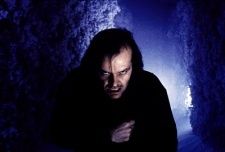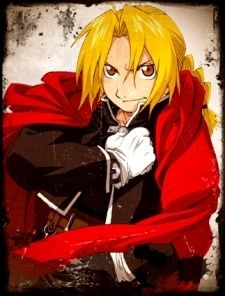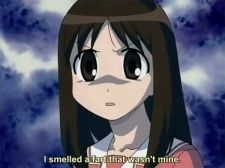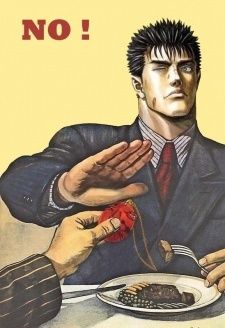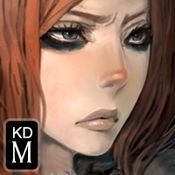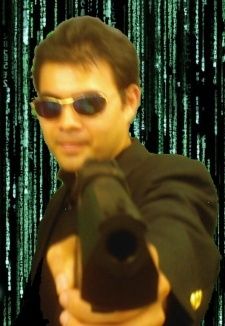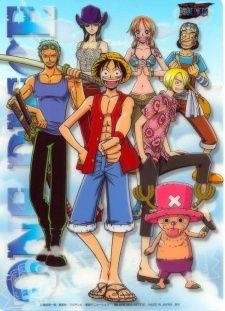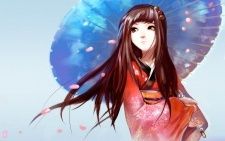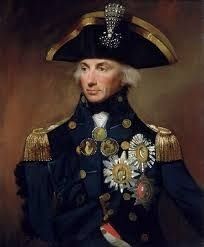
Obsession is a very strange thing indeed, and may be one of the few human traits that so clearly falls between heaven and hell. What one does with their obsession though, well, therein lies an altogether different proposition, especially as people often define their "obsessions" in terms of what they love and hate, or even what brings them hope and fear. Isn't it strange then, that such a well known human trait can so easily be mistaken for something else entirely? Or is it simply a case of people not seeing what they don't want to see, especially if there something new and shiny to watch? Many animefans are currently raving about the new series of Full Metal Alchemist, especially as it is an almost direct adaptation of the manga, however in the light of all this new found glory, the original adaptation has become the topic of much debate and controversy, especially by those who once praised the show for being something ... a little different. Now unlike many, the fact that the original adaptation didn't follow the manga for much of its run was something that I wasn't overly concerned about, and there's a very good reason for this too. One of the issues I had with the manga, and in turn Brotherhood, was the fact that the tale is far more "shounen" than the original adaptation, and this difference in not only plot and story content, but overall perspective as well, is noticeable in a number of areas. As far as pacing, plot, and depth of story goes, Full Metal Alchemist does lose out somewhat to Brotherhood, however this is partly due to the fact that Arakawa Hiromu had far more time to produce a story that worked, whereas the writers for the original adaptation only had part of Arakawa's work to play with, and had to make up the rest. Normally this would be the cause for a number of issues, not the least of which is continuity, however Full Metal Alchemist never really suffered from those except where the numerous, and unnecessary, comedy moments were included. That said, what the writers achieved was actually quite remarkable, as they produced a tale that is very clearly about one thing only - obsession - and in that respect, they actually managed to score quite a major coup over Arakawa's tale. Some of you may be a tad confused by where this is all going, but fear not, it will become clearer as we get into more detail. Let's talk more about the actually show itself for a moment though. In terms of looks, the original adaptation managed to transpose the characters fairly well, and while they didn't really require any bouts of creativity in general, there were a few new faces as, at the time, the manga hadn't actually introduced all the players. As for the various locations in which the characters find themselves, the first adaptation generally followed the path laid down by the manga, however there were also some surprisingly original and inventive additions to the various locales, many of which are unique to this particular adaptation. Strangely enough though, the quality of the animation is almost the same as that of Brotherhood, and given the large degree of crossover in both adaptations, this is actually surprising as usually one version is greatly superior to the other. That said, the new series does have the advantage of seven years of improvements in animation, so one would be forgiven for thinking the margin between the two would be bigger. Where sound and music are concerned, one might expect more pronounced differences between the two adaptations, however this is not the case. The selection of music for the first adaptation is actually very good throughout the series, and also gave rise to one of the catchiest opening themes in shounen anime - "Ready Steady Go" by L'Arc-en-Ciel. The aural effects are well chosen and choreographed, and while there are many occasions that feature frenetic clashes and lots of noise, care has generally been taken to modulate this to a level that won't unnerve the viewer (admittedly there are some minor overwhelming moments, but they're not really worth going into any detail as they don't really affect the story in any way). As for the acting, granted there are some different seiyuu between the two adaptations, but the series' big guns are in force in both. That said, while there is some acting continuity between the two, the actual quality is a little better in Brotherhood, however this may be due to an increased familiarity with the characters, and also because Brotherhood is far more a straight forward shounen tale than the original adaptation- something which actually shows in the acting. And now to the most interesting bit - the characters. Unlike both the manga and Brotherhood, the original anime adaptation of Full Metal Alchemist featured some surprising and unique characters, not the least of which is Edward Elric himself. But before we get into that though, let's talk Homunculi. One of the most overlooked aspects of the original series was the nomenclature given to the homunculi, and although their names and purpose have been "clarified" by the manga and Brotherhood, the writers for the original adaptation didn't have this knowledge, so they actually made them work in a completely different way. The whole deal with the Seven Sins is very different in the first anime, as the writers used the homunculus to highlight the aspect of obsession throughout the series. This is why the first anime adaptation had them being "born" in a particular manner, rather than the more trite reasoning given in the manga and Brotherhood much later. The homunculi are effectively born from the obsession of humans, a theme which is also present in Arakawa's version of the story, even though it has been downplayed a lot. So what does this have to do with the characters? Well, rather a lot actually. Throughout the whole series, there are very few characters who don't show any of the visible signs that one would normally associate with obsessive behaviour, and this is because they're cleverly hidden for the most part. From Maes Hughes' constant babble about his daughter, to Winry's love of automail. From Izumi Curtis' longing for her baby, to Dante's desire for immortality (incidentally, one has to wonder why that particular character was called Dante). And right at the top of the list is Edward Elric. In essence, his obsession with being better than his father is what starts the whole chain of events, which then turns to his obsession with the Philosopher's Stone, and so on. The surprising thing though, is that Ed never actually lets go of his desires in the same manner that others who attempted human transmutation did, and there is actually proof of this too. One look at the manner of Alphonse Elric's return to his body, as well as the nature of that return, will highlight just how very different this show is to Arakwa's version, and how different the mentality is come the end. And if you want more clarification on this, then feel free to ask. The characters are actually pretty well developed throughout the series, and it's a testament to the writer's and seiyuu's abilities that they turned out as well as they did. That's not to say there aren't any problems, however the flaws with the characters stem mainly from a difference in goals and perspective rather than any real lack of talent. In all honesty, it's difficult to decide which version is actually better as the differences in plot, theme and character development make this version and Arakawa's two very different tales. That said, there will be those who fall on one side or the other, some preferring the darker nature of the first adaptation while others like the more direct approach of the manga and Brotherhood. Personally, I found both versions to be very good, especially as the route that Arakawa's tale takes bears almost no resemblance to this one. While there are some broad similarities between the two in terms of locale, characters and basic plot, in actuality these are only skin deep, as the original adaptation of Full Metal Alchemist deviates quite a lot from the typical shounen sensibilities come the end of the series. The obsessive theme of the first adaptation is a far cry from what one is given in the manga and Brotherhood. Regardless of which version one prefers though, the simple fact is that we, as anime fans, have been given two great takes on the story, and we should count ourselves lucky to have such a wealth as all too often we must suffer through mediocrity and crap just find some entertainment. It just a shame that so many people feel the need to side with one version or the other ...
